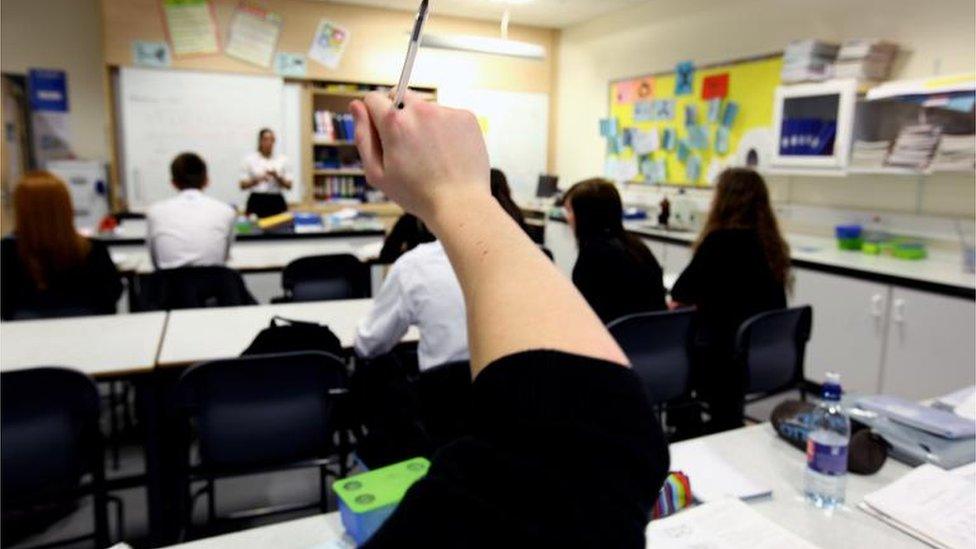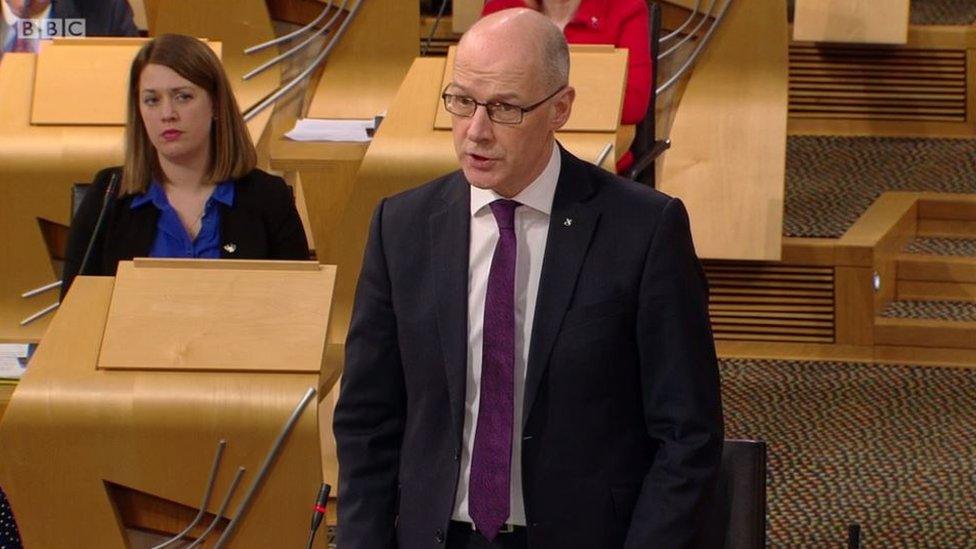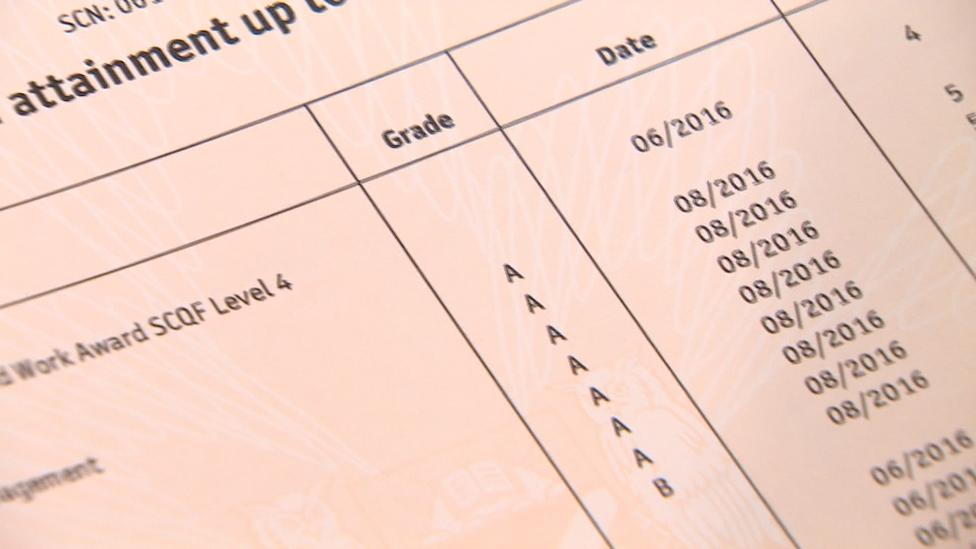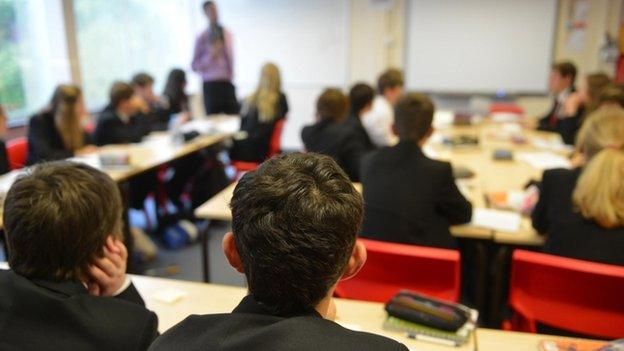Scottish schools drop in world rankings
- Published
- comments

Scotland was slightly ahead of England in reading and maths and a little behind in science when the tests were last done in 2013
Scotland's schools have recorded their worst ever performance in an international survey of pupils.
Scotland's scores for maths, reading and science all declined in the latest set of Programme for International Student Assessment (Pisa) figures.
It was the first time since the tests began in 2000 that all three subject areas were classed as "average", with none "above average".
Education Secretary John Swinney said the results made uncomfortable reading.
He said they showed that "radical reform" was needed if Scotland's education system was to become world-class again.
Opposition parties said the results showed a "decade of educational failure" under the SNP government, with First Minister Nicola Sturgeon previously saying she wanted to be judged on her record on education, external.
Scottish schools drop in world rankings
Teachers called for a "period of stability" following the results, which saw Scotland fall from "above average" in reading and science to "average".
The Pisa testing system was set up in 2000 among countries from the Organisation for Economic Co-operation and Development (OECD).
Half a million 15-year-olds took part in the latest round of tests, which cover literacy, numeracy and science, in March 2015.
Scotland's scores in the latest tests were lower in all three areas than they had been in any previous Pisa survey, with the country's ranking for science dropping from "above average" to "average", while maths and reading both remained "average".
In 2000, when Scotland first took part in the OECD survey of 15-year-olds, its performance in reading, science and maths were all above average.
While Scotland remains within the statistical average for the OECD, its relative position against some overseas countries and some other UK administrations has slipped, with the number of countries recording better scores in each subject increasing and the number recording worse scores falling.
In maths, only five countries had better scores in 2000, and 21 countries had worse.
Higher scores
By 2015, 14 countries recorded better results, while the number with worse scores was down to 10.
The comparison with other parts of the UK suggest that English pupils were "significantly above" Scots in science while Welsh schools performed "significantly below Scotland" in each topic.
For science, the results showed 12 countries doing better than Scotland, including England, Australia, Estonia, Finland and Slovenia.
In mathematics, Estonia, Finland and Slovenia again scored above Scotland, as did Norway, Belgium, Ireland and Poland.
There were also 13 countries with higher scores in reading, including Estonia, Poland and Slovenia, as well as Ireland, Finland and Norway.
Countries such as Australia, Germany, the Netherlands, New Zealand and Norway maintained their performance but moved ahead of Scotland as its score declined.
Meanwhile, Slovenia saw a 24-point improvement over the three years, going from below Scotland to being ranked above it.

John Swinney told MSPs that the figures did not make comfortable reading
Mr Swinney, who made a ministerial statement at Holyrood on the results, pledged an "unwavering focus on improvement".
He said: "There is great strength in Scottish education but these results underline the case for radical reform of Scotland's education system.
"The results undoubtedly make uncomfortable reading but they contain a plain message: we must continue to make the changes that are necessary to strengthen Scottish education."
The education secretary told MSPs that the poverty-related attainment gap was a "complex challenge".
He pointed out that the latest Pisa survey was carried out in March 2015, saying that a "range of actions" had been taken since to improve education.
Mr Swinney said there was a "relentless drive to reduce red tape and ensure teachers are freed up to teach", pointing to changes to National Qualifications to address the burden of over-assessment on young people and teachers.
He said that he had spoken with his international panel of advisors, who did not describe an education system in crisis but the need to "remain focused on taking forward the careful plans" already in place.
And he also said some responsibility fell on local authorities, which he said had been fairly treated in government budgets, saying he had actually prevented many Labour-run councils from reducing teacher numbers.

The Scottish exam system has been overhauled in recent years
Recent years have seen the Curriculum for Excellence introduced in Scottish schools, and the country's qualifications system overhauled.
Scottish Secondary Teachers Association president Euan Duncan said the changes had "added tremendously to the pressure on teachers and youngsters".
He said: "Furthermore, reductions in support staff and shortages of supply teachers have taken teachers away from their core function.
"There is no magic solution to improving the downward Pisa performance trend, but good starting points would be to provide teachers with very clear aims and sufficient resources with which to achieve them."
'Snap judgements'
But Scotland's largest teaching union, the EIS, warned against making "snap judgements" based on the Pisa figures, and said it was important to instead "analyse the full range of data it makes available".
Its general secretary, Larry Flanagan, added: "The need for continuing investment in education is made clear, however, by this report.
"The Scottish government must ensure that schools are properly resourced and supported if we are to achieve the goals of tackling the poverty-related attainment gap and providing all young people with the chance to reach their potential."

Analysis by Jamie McIvor, BBC Scotland education correspondent
Scotland is not a star pupil. The country's performance in the PISA assessments is distinctly average. A teacher writing a report card could easily say: "Disappointing performance. Could do better."
The Pisa figures are not the last word on education. They are not a definitive measure. There are many critics. But because they are the nearest thing there is to a fair way of comparing the education systems of different countries they have a huge influence on policy and political debate.
One reason they make for such uncomfortable reading for the Scottish government, is that it wants to be judged by its success on education. It makes much of its commitment to raise attainment and narrow the gap between how well youngsters from relatively rich and poor areas do at school.

Scottish Conservative education spokesman Liz Smith said the "shocking statistics" were a "damning indictment of a decade of failure under the SNP".
She added: "The fact that the SNP has been so obsessed with independence has meant that it has taken its eye completely off the ball when it comes to education.
"Nicola Sturgeon says she wants to be judged by her performance on education but parents will rightly wonder what on earth her Scottish government has been doing for the last 10 years.
"Children going through our schools under the SNP are finishing their school careers less equipped in basic skills and performing less well than their counterparts elsewhere in the UK, and in a host of other countries across the world."
'Going backwards'
Scottish Labour's education spokesman Iain Gray said: "SNP ministers should be ashamed of these results. For all their warm words about making education a priority we are seeing performance going backwards as Scotland drops down international league tables."
Mr Gray asked Mr Swinney to apologise for the figures and called on Finance Secretary Derek Mackay to protect council funding in his forthcoming budget. Mr Swinney said the statistics were "unacceptable and must be improved upon", but insisted there had been "strong, fair settlements for local authorities" under the SNP.
Ross Greer of the Scottish Greens said: "This drop in performance is clearly a concern. We need to listen to teachers and invest in what they know will make a difference - namely more staff and a simplified workload following years of changes, so that they have more time to connect with their students."
And Tavish Scott of the Lib Dems said there was "no escaping the fact that surveys show the SNP have overseen a worrying decline in our education system". He asked if there would be a reduction in the 20,000 pages of guidance given to teachers, leading Mr Swinney to say that there would be a "huge reduction in the volume of paperwork".
Meanwhile Keir Bloomer, of think tank Reform Scotland and chair of the Commission on School Reform, said the education system was now in urgent need of action.
He said: "It is no longer credible to describe Scotland's education system as world leading.
"There is a critical and urgent need to examine how Scottish education is run, and the Scottish government's stated intention to empower teachers, parents and schools must be matched by action."
- Published6 December 2016

- Published6 December 2016